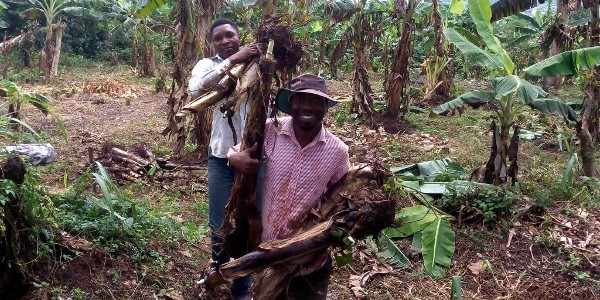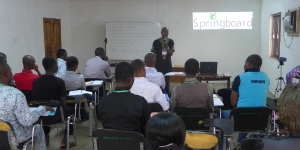Pourquoi ce nigérian a choisi l’agriculture rurale plutôt qu’un costume et une cravate en ville?
Son histoire:
En 2007, lorsque Laurent Alaba Afere diplômé de l’université, il a choqué sa famille lorsqu’il a dit qu’il ne va pas utiliser son diplôme de gestion d’entreprise pour atteindre un emploi bien rémunéré dans la grande ville. Au lieu de cela, il a voulu poursuivre l’entrepreneuriat social dans l’agriculture dans sa ville natale Akure, une communauté à faible revenu dans le sud-ouest du Nigeria.
«Ce fut une décision difficile parce que mes parents et frères et sœurs ne sont pas heureux que je rentre chez moi. Ils attendaient que j’obtienne un emploi dans la ville et ensuite être capable de les aider ».
Sa famille a pensé qu’il doit être ensorcelé. Après tout, qui aurait volontiers choisi la dure labeur de l’agriculture sur un emploi à haut niveau de salaire? « Mais je dis à mes parents:« S’il vous plaît papa, s’il vous plaît maman, je dois faire quelque chose de différent dans ma vie. »
Et cela est exactement ce qu’il a fait. Aujourd’hui, il est le fondateur de Springboard, un organisme qui combine l’agriculture biologique avec la formation entrepreneuriale pour créer des emplois et de promouvoir l’agriculture durable. Il offre aux jeunes des cours sur l’agriculture et des affaires des compétences pratiques. Les participants sont également placés en petits groupes . Après la récolte, chaque groupe reçoit 80% du bénéfice, les 20% restants étant réinvesti dans la durabilité de Springboard.
Et les parents de Afere ne pouvaient pas être plus fier. L’organisation n’a pas seulement généré des revenus stables pour lui-même, mais pour beaucoup d’autres jeunes de sa communauté. Son initiative lui a également conduit d’être nommé Mandela Washington Fellow l’an dernier, où il a passé quelques semaines à la réunion avec le président américain Barack Obama et un certain nombre de chefs d’entreprises mondiales.
—————-Il a été inspiré par les statistiques choquantes:
L’entrepreneuriat social n’était pas dans son plan initial quand il a gagné l’admission à des études de commerce à l’université. Comme beaucoup dans sa classe, il était excité à propos d’un emploi au sein de la banque ou de l’huile et du gaz secteur. « Et j’ai étudié très dur pour que je puisse sortir avec de bons résultats qui pourraient me faire un bon travail. »
Mais il n’a jamais oublié le moment exact que tout cela a changé pour lui. C’était le vendredi 17 Novembre 2006. Il était à la bibliothèque, de rattrapage sur quelques nouvelles avant de tomber sur un livre un rapport en fait publié par le ministre de l’éducation. Il a révélé quelques statistiques choquantes à propos du chômage, et la façon dont la majorité des jeunes qui terminent l’école ont été incapables de trouver du travail. Mais le plus choquant de tous était l’effet prédit que cela aurait sur la population.
« Il est écrit en 2020, le Nigeria – mon cher pays – va recueillir plus de 20 millions de criminels hautement qualifiés. Chaque année, nous élevons plus d’un million criminels qualifiés … Nous ne produisons pas des professionnels hautement qualifiés en médecine, en droit, les compétences professionnelles, mais nous soulevons des criminels.
« Et donc tous mes plans pour la vie, tout a changé depuis cet instant. J’ai décidai que plutôt de simplement obtenir un emploi, permettez-moi plutôt d’aider les jeunes Nigérians à obtenir des emplois – et dans le processus obtenir quelque chose pour moi « .
————Un importateur net de produits alimentaires? C’est fou!
Une fois Afere savait qu’il voulait être un entrepreneur social axé sur la formation des jeunes et la création d’emplois, l’étape suivante était de savoir d’où il pourrait mieux faire. Au Nigeria l’agriculture a attiré son attention.
« Pourquoi avons-nous importé beaucoup de nourriture dans le pays où nous avons des millions d’hectares de terres que nous pourrions utiliser pour produire notre propre subsistance? Pourquoi sommes-nous encore insensée – acheter de la nourriture de l’Inde, de la Thaïlande, tous ces pays d’Asie? Des millions d’hectares de terres perdent chaque année « a t-il souligné.
« Si vous combinez l’agriculture auprès des jeunes, vous pouvez transformer ce pays en moins de temps qu’à mis les autres. Et voilà pourquoi je décidai que je vais les aider à faire cela « .
En 2008, il a lancé le Projet agricole de la jeunesse qui a rassemblé des jeunes dans sa communauté à cultiver des terres. L’initiative a commencé à croître et a été rebaptisé Springboard en 2012. Il a formé plus de 500 jeunes depuis sa création. Et le programme est également mise à l’échelle des opérations de sorte qu’il peut former 100 personnes tous les six mois.
«Nous avons actuellement accès à plus de 15 hectares de terres agricoles, et de la communauté est prête à nous donner plus de terres si nous avons plus de jeunes à former. »
Vers la fin de l’année dernière, Afere également réussi à lever suffisamment de capitaux pour démarrer la construction d’une usine de chips de transformation et de conditionnement. Et le mois dernier, il a commencé la production des chips de plantain marque de Springboard. Ils sont déjà vendus dans trois Etats du Nigeria, et Afere prévoit distribuer à d’autres pays africains dans le futur.
—————————L’agriculture est une entreprise
Selon Afere, l’un des objectifs de cette initiative est de changer la perception de l’agriculture chez les jeunes nigérians. Beaucoup ne considèrent pas comme un chemin de carrière attrayant.
» Surtout les jeunes dans les zones rurales et semi-urbaines; ils ont vu leurs parents au fil des ans que les agriculteurs souffrent … Ils sont si pauvres et les intermédiaires font plus d’argent que ce qu’ils font. Et si ces jeunes sont découragés. Ceci est une raison pour laquelle ils veulent quitter les zones rurales et d’aller vers les villes à la recherche d’emplois « .
Pour ralentir cette tendance Afere espère faire de l’agriculture «à la mode» chez les jeunes. « Nous les aidons à voir il y a un bon marché pour les produits, et que vous pouvez réellement devenir riche avec la culture de la terre. »
L’initiative enseigne également des compétences en affaires, comme la façon agri-entrepreneurs peuvent se produire sur le marché sans utiliser les intermédiaires qui coupent dans les bénéfices.
«L’agriculture doit être une entreprise. Il ne devrait pas être considérée comme quelque chose que seuls les gens pauvres font. Vous pouvez construire votre ferme et il peut devenir une grande entreprise. Donc, nous enseignons l’agriculture comme une entreprise. Et si vous exécutez votre entreprise ainsi, il peut vous aider à gagner un bon revenu. Voilà ce que nous les aidons à voir:. Ils sont un agriculteur et ils sont un entrepreneur »
Le programme, a t-il expliqué, montre que de bons agriculteurs et de bons entrepreneurs ont beaucoup en commun. Par exemple, pour entretenir et développer les cultures et les sociétés exigera beaucoup de travail, le travail d’équipe, ré-investissement, la gestion du temps, la planification et de la patience.
« Un agriculteur doit être patient, permettant à ses cultures pour grandir et mûrir avant la récolte. La même chose avec les entrepreneurs – ils sacrifient la gratification instantanée pour le succès à long terme « , a t-il poursuivi.
—————De grands changements commencent petit
Selon Afere, il a connu des changements positifs au cours des deux dernières années, plus de jeunes gens commencent à voir les avantages de l’agriculture.
« Je vous le dis, tous les jours sur les médias sociaux, vous voyez beaucoup de jeunes de mettre leurs photos sur Facebook et de dire à leurs amis qu’ils sont des agriculteurs en ce moment. Donc, les jeunes se rendent compte d’une façon que le Nigeria va se développer en revenant à notre amour passé, qui était l’agriculture « .
Il conseille d’autres qui veulent poursuivre l’entrepreneuriat soient conscients des risques, et assurez-vous qu’ils sont entraînés par quelque chose de plus qu’un gros chèque de paie.
« Peu importe combien vous êtes payé, il ne compare pas avec la récompense qui vient lorsque vous suivez le chemin de l’esprit d’entreprise, parce que les entrepreneurs changent le monde. Alors demandez-vous – voulez-vous transformer ce monde?
« Pour moi, je veux faire une chose très importante: je veux changer ce monde. Et je l’ai commencé à le faire dans ma petite communauté ici au Nigeria « .
Source: Howwemadeitinafrica



Leave a Reply